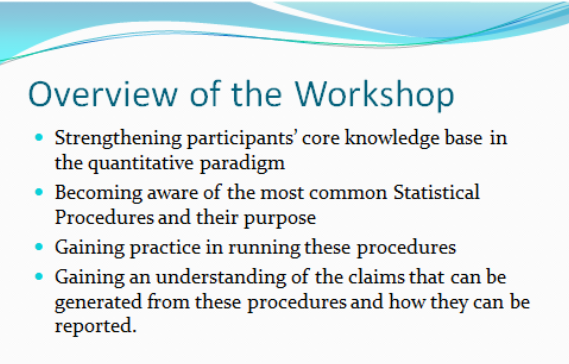
This is an intermediate, applied course covering a range of the most commonly used statistical procedures. It aims to provide participants with an ability to understand, run and interpret these procedures.This course will further enhance your ability to understand research based literature where these procedures were employed.
*This course will be run over 5 days in three sessions per day:
- 10.00am - 11.30pm - Sessions 1
- 12.00pm - 1.30pm - session 2
- 2.30pm - 4.00pm - Session 3
Exercises will be provided and Individual consultation sessions will be for 30 minutes to an hour for each participant by appointment.
*Please note: Courses will run on Australian Eastern Daylight Time (GMT +11)
(ie Melbourne, Sydney, Canberra daylight savings time. There will be 5 different time zones to consider in Summer)
Dr Gordon Emmerson is a specialist in quantitative research. He taught undergraduate and postgraduate statistics programs at Victoria University within the Psychology Department, where he currently holds the position of Honory Fellow. He coordinated a major in Social Research Methods. Gordon was employed as a statistical/methods advisor to university staff in the US at Kansas State University in the late 1980s. He is an experienced group facilitator and regularly conducts workshops across a range of topic areas. He is an experienced user of data management and statistical packages including SPSSwin, Excel and Access. He has also undertaken a number of consultancies in quantitative research in the health and education sector.
This is an intermediate, applied course covering a range of the most commonly used statistical procedures. Research design, Experimental, Quasi-Experimental and Non-Experimental, will be covered so students can select the best design and statistical procedure for a research project, and to clarify exactly what claims can be made in relation to findings. It aims to provide participants with an ability to understand, run and interpret procedures. This course will further enhance your ability to understand research-based literature.
The level falls between ‘Fundamentals of Statistics’, and the more detailed single procedure based courses. This course will provide a good foundation for progression to the more detailed courses in (Multiple) Regression, Factor Analysis, SEM and Latent Variables using Mplus. On completing this course you should be able to read and understand literature where these procedures are reported, select the appropriate statistical procedure for research, run the procedure, and report the results from an informed base of understanding.
The course is taught from an applied prospective, with questions encouraged. The statistical package employed will be SPSS. No prior knowledge of SPSS is required.
The target audience for this course range from Qualitative researchers wanting to gain Quantitative skills, to Quantitative researchers wanting to broaden their understanding across procedures, or to become more comfortable with covariance prior to taking SEM.
Day 1
The context of quantitative research in relation to qualitative research. The language of quantitative research, and the required fundamentals of SPSS.
Day 2
Reliability, Correlations, Controlling for Confounding Variables, Chi Squares, and T-Tests.
Day 3
ANOVAS, ANCOVAS, Factoral ANOVAS, MANOVAS and Non-Parametric Tests.
Day 4
Simple Regression, Multiple Regression, Discriminate Analysis and Factor Analysis.
Day 5
Testing Normality, Weighting, Data Transformations, Validity, Reporting and Ethics.
Individual Consultations by appointment
The procedures that will be covered will include the following:
- The frequency based statistics of Chi Square Goodness of Fit and Chi Square Test of Association.
- The Parametric test of difference statistics of T-tests, ANOVA, ANCOVA, MANOVA, and MANCOVA. Factorial analysis with multiple independent variables will also be covered along with Repeated Measures ANOVA.
- The Non-Parametric test of difference statistics of Mann-Whitney, Wilcoxon, Friedmans Analysis of Variance, and Kruskal Wallis.
- The statistics to predict and to explain variance of Simple Regression, Multiple Regression, Discriminant Analysis and Multiple Discriminant Analysis.
- The data reduction technique of Factor Analysis
- Power, the data and statistics that are most powerful, and techniques for increasing statistical power
- How to determine the best procedure for the demands of the research
- Data transformation to increase power and allow parametric procedures to be employed when data can be appropriately adjusted.
- The important interplay between effect size and significance.
- The integration of statistical results into reports.
Training in this course will be for 4 hours per day (2 morning, 2 afternoon) over ZOOM.
Questions are encouraged. There will be lecture contact, small group practice and workshop time.
Individual consultation sessions will be for 30 minutes to an hour for each participant by appointment.
Participants should have an understanding of elementary statistics equivalent to the syllabus of Fundamentals of Statistics. This lab based course requires students to follow instruction in running and interpreting a range of statistical procedures. It is assumed that participants will have little or no familiarity with at least some of the procedures presented.
The statistical package employed will be SPSS. No prior knowledge of SPSS is required.
The instructor's bound, book length course notes will serve as the course text.
The notes will be sent to you in advance.
Q: Do I have to have had prerequisites to do this course?
A: Yes, you will have been expected to have some knowledge of elementary statistics equivalent to ACSPRI's Fundamentals of Statistics Course.
Q: Do I need to know SPSS?
A: No prior knowledge of SPSS is required.
This is an amazingly well-balanced course (Online Winter 2020)
The statistical procedures were clearly explained and applied to practical research questions. All questions were clearly answered. (Online Winter 2020)
I really enjoyed the way the course is structured. After the theoretical part, there is always hands on applications of the theory. Really appreciate this. (Summer 2020)
Gordon has a great way of balancing and explaining complex stats procedures, helping the class apply their knowledge through completing labs. (Summer 2020)
It helped me brush up on skills I had forgotten but also taught me some new concepts & challenged me in new ways. It was perfect for my knowledge/skill level. (Summer 2019)
Excellent mix of explanation,written examples, diagrammatic representation of concepts, demonstrated procedures and practical labs. A lot of time allocated to answering questions. (Summer 2019)
The lecture combined with the hands on lab activities allowed for me to practice what was just learned and that was invaluable. (Spring 2018)
The individual attention provided - where I could discuss my research data was very useful (Winter 2018)
Improved my understanding of stats which will help in reading the literature and designing future studies. (Summer 2018)
It has filled in a lot of gaps in my knowledge. I had used most of the techniques and stats before but never had an understanding of why I used them for different data sets. (Summer, 2017)
The instructor was great the best I have had by far. Great pacing and cover of important tests. (Spring 2016)
Filled in lots of gaps in my knowledge in a systematic way. Use of SPSS on the screen by the lecturer meant it was a hands on course. (Winter 2016)
It covered a variety of statistical techniques that I wanted to learn. It's highly practical and applied and plenty of real life examples were given by Gordon. (Spring 2015)
Great idea to have consultation available at the end as well. (Winter 2015)
The instructor's bound, book length course notes will serve as the course text.
These will be sent to you in advance.
